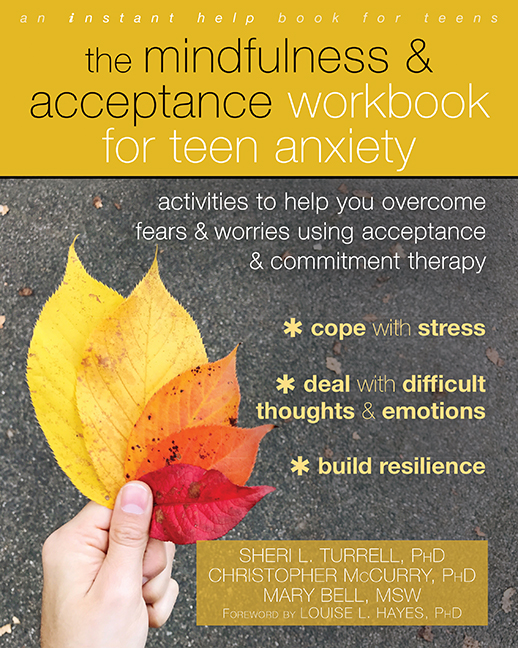Adapted from an excerpt from The Mindfulness & Acceptance Workbook for Teen Anxiety
We live in a world where we are taught that certain feelings are bad, happiness is the preferred way to feel, and if we aren’t happy, we should fix this. So, when we feel anxious (or stressed, overwhelmed, or nervous), we’re often mad at ourselves for having these feelings, and we try to make them go away. We might avoid people, places, or situations to prevent the thoughts and feelings from showing up in the first place, and once they do show up, we might distract ourselves so we don’t really notice them.
We might even hear other people tell us, “Calm down,” or “Take your mind off it.” The things we do to prevent or try to get rid of thoughts and feelings are called “control strategies” because they are about controlling, or getting rid of, what we are feeling inside. Sometimes control strategies are helpful. They make us feel better for a while, which is what makes it so tempting to use them over and over again. We use the term DOTS (distracting, opting out or avoiding, thinking, self-harm) to categorize the control strategies that are commonly used by teens to avoid feeling anxious or to get rid of anxiety once it starts.
Distract, Distract, Distract
Whatever we do to distract ourselves from our anxious thoughts and feelings usually makes things more difficult in some way. So why do we use distractions? Because, in the short term, they work. They take us away from noticing our thoughts and feelings, or at least from noticing them as intensely. There can be a lot of pressure to “feel better” and control our worrying. And many people, young and old, feel badly about themselves (another worry!) when they can’t control their anxiety. Trying to control thoughts and feelings, however, can be harder than you think. Try these activities to see just how hard it can be.
Anti-Worry Exercises
Grab a lemon and cut a slice. Hold the slice in your hand and just look at it. Now, bring the slice of lemon to your nose and gently sniff the lemon, taking in the smell. Now, here’s the challenge: don’t salivate! (In other words, don’t have the feeling of your mouth watering.) First, lick the lemon or put a bit of juice on your tongue and notice what happens. Now take a bite of the lemon or lick some juice, and notice what happens in your mouth. Did you remember not to salivate?
Probably not. Were you able to control your inclination to salivate when you tasted the lemon? Is it possible to actually control your thoughts, feelings, or physical sensations just because you want to? It may appear that the people around you are doing this successfully. But they are no better at it than you are.
As you go about your day, today and onward, notice the messages that are out there about controlling your feelings. (For example, “Just think about something else.”) This may come from well-meaning family, friends, or others in your life; the media; or elsewhere. Make some notes about what you notice.
There is a simple reason for your inability to control thoughts, feelings, and sensations: you are human! Anxiety is like any other feeling: we all have it, just like happiness, sadness, fear, shame, anger, and guilt. You can’t control having feelings. You can learn to control what you do when feelings show up.


 Get your copy today!
Get your copy today! 2024 Peace Playbook: 3 Tactics to Avoid Clashes with Your Partner
2024 Peace Playbook: 3 Tactics to Avoid Clashes with Your Partner